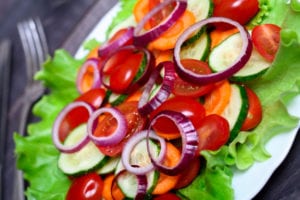Written by Joyce Smith, BS. This study suggests that vegans, vegetarians and pescatarians in Norway are not only at risk of iodine deficiency but have limited knowledge of iodine as well.
 Emerging plant-based diets 1, gaining in worldwide popularity, have been associated with many health benefits, particularly with respect to cardiovascular disease risk reduction 2. The vegetarian diet omits meat and excludes in varying degrees milk, fish and eggs, while the pescatarian diet of no meat will allow fish or eggs in varying degrees, and the vegan diet of strictly plant-based foods excludes all kinds of animal products. The three diets have a serious flaw in that they may all contribute to nutritional deficiencies 3,4.
Emerging plant-based diets 1, gaining in worldwide popularity, have been associated with many health benefits, particularly with respect to cardiovascular disease risk reduction 2. The vegetarian diet omits meat and excludes in varying degrees milk, fish and eggs, while the pescatarian diet of no meat will allow fish or eggs in varying degrees, and the vegan diet of strictly plant-based foods excludes all kinds of animal products. The three diets have a serious flaw in that they may all contribute to nutritional deficiencies 3,4.
As a result of a mandatory fortification of cow’s fodder, seafood and eggs 5,6, Norway’s main dietary source of iodine is milk. Iodine, a trace element, plays a vital role in growth and development and when dietary iodine deficiencies exist, particularly during pregnancies, hypothyroidism and impaired neurodevelopment, including cognitive development can occur 7. While macroalgae (seaweed) is consumed by vegans, it’s concentration in seaweed varies and may even reach toxic levels 8.
In response to the rising interest in veganism, the research team of Groufh-Jacobsen sought to evaluate the iodine content in the diet, the use of iodine supplements and seaweed, and the knowledge concerning iodine in a population of vegans, vegetarians and pescatarians. The research team 9 evaluated iodine status among 225 Norwegian participants: 115 vegans, 55 vegetarians and 35 pescatarians, aged 18–60 years. Electronic questionnaires on a 24-hour food and supplement intake allowed the team to assess iodine intake from foods, supplements and seaweed. Urinary samples provided urinary iodine concentrations.
Urinalysis, (based on the World Health Organization (WHO) standard 10, showed that vegans were moderately iodine deficient with a median urinary iodine concentration (MUIC) greater than 50 ug/L, while vegetarians and pescatarians were mildly iodine deficient (MUIC < 100 ug/L) and had higher UIC compared to vegans (p = 0.030).
Comparing vegetarian and pescatarian users of iodine supplements and seaweed to vegetarian and pescatarian non-users did not change MUCI values (p=0.424); however, vegan non-users of iodine supplements or seaweed had significantly lower levels of MUCI compared to vegan users (p=0.002).
Iodine intake from foods and supplements revealed that 54% of vegans, 51% of vegetarians and 46% of pescatarians had total 24-hour iodine intakes below the estimated average requirement (EAR) of 100 ug/day, which may increase the risk of iodine deficiency. Interestingly, of the seaweed users, 18% of vegans, 16% of vegetarians and 9% of pescatarians had iodine intakes above UL (600 ug/day), making habitual use of seaweed a risk for excess iodine intake. When testing the participants’ knowledge of iodine’s health benefits, researchers found a positive, albeit weak correlation between the participants knowledge and their total iron intake. These results amplify the need for dietary guidelines, particularly for vegans, vegetarians and pescatarians, to insure adequate iodine supplementation for those who don’t supplement and to prevent excessive iodine intake for those who consume seaweed.
Source: Groufh-Jacobsen, Synne, Sonja Y. Hess, Inger Aakre, Elin Lovise Folven Gjengedal, Kristina Blandhoel Pettersen, and Sigrun Henjum. “Vegans, Vegetarians and Pescatarians Are at Risk of Iodine Deficiency in Norway.” Nutrients 12, no. 11 (2020): 3555.
© 2020 by the authors. Licensee MDPI, Basel, Switzerland. This article is an open access article distributed under the terms and conditions of the Creative Commons Attribution(CC BY) license (http://creativecommons.org/licenses/by/4.0/)
Click here to read the full text study.
Posted January 4, 2021.
Joyce Smith, BS, is a degreed laboratory technologist. She received her bachelor of arts with a major in Chemistry and a minor in Biology from the University of Saskatchewan and her internship through the University of Saskatchewan College of Medicine and the Royal University Hospital in Saskatoon, Saskatchewan. She currently resides in Bloomingdale, IL.
References:
- Leitzmann C. Vegetarian nutrition: past, present, future. Am J Clin Nutr. 2014;100 Suppl 1:496s-502s.
- Craig WJ. Health effects of vegan diets. Am J Clin Nutr. 2009;89(5):1627s-1633s.
- Schüpbach R, Wegmüller R, Berguerand C, Bui M, Herter-Aeberli I. Micronutrient status and intake in omnivores, vegetarians and vegans in Switzerland. Eur J Nutr. 2017;56(1):283-293.
- Elorinne AL, Alfthan G, Erlund I, et al. Food and Nutrient Intake and Nutritional Status of Finnish Vegans and Non-Vegetarians. PLoS One. 2016;11(2):e0148235.
- Carlsen MH, Andersen LF, Dahl L, Norberg N, Hjartåker A. New Iodine Food Composition Database and Updated Calculations of Iodine Intake among Norwegians. Nutrients. 2018;10(7).
- Nerhus I, Wik Markhus M, Nilsen BM, et al. Iodine content of six fish species, Norwegian dairy products and hen’s egg. Food Nutr Res. 2018;62.
- Zimmermann MB. The role of iodine in human growth and development. Seminars in cell & developmental biology. 2011;22(6):645-652.
- Duinker A, Roiha IS, Amlund H, et al. Potential risks posed by macroalgae for application as feed and food–a Norwegian perspective. Natl Inst Nutr Seaf Res. 2016:1-24.
- Groufh-Jacobsen S, Hess SY, Aakre I, Folven Gjengedal EL, Blandhoel Pettersen K, Henjum S. Vegans, Vegetarians and Pescatarians Are at Risk of Iodine Deficiency in Norway. Nutrients. 2020;12(11).
- World Health Organization (WHO). Assessment of iodine deficiency disorders and monitoring their elimination: a guide for programme managers. 2007.
